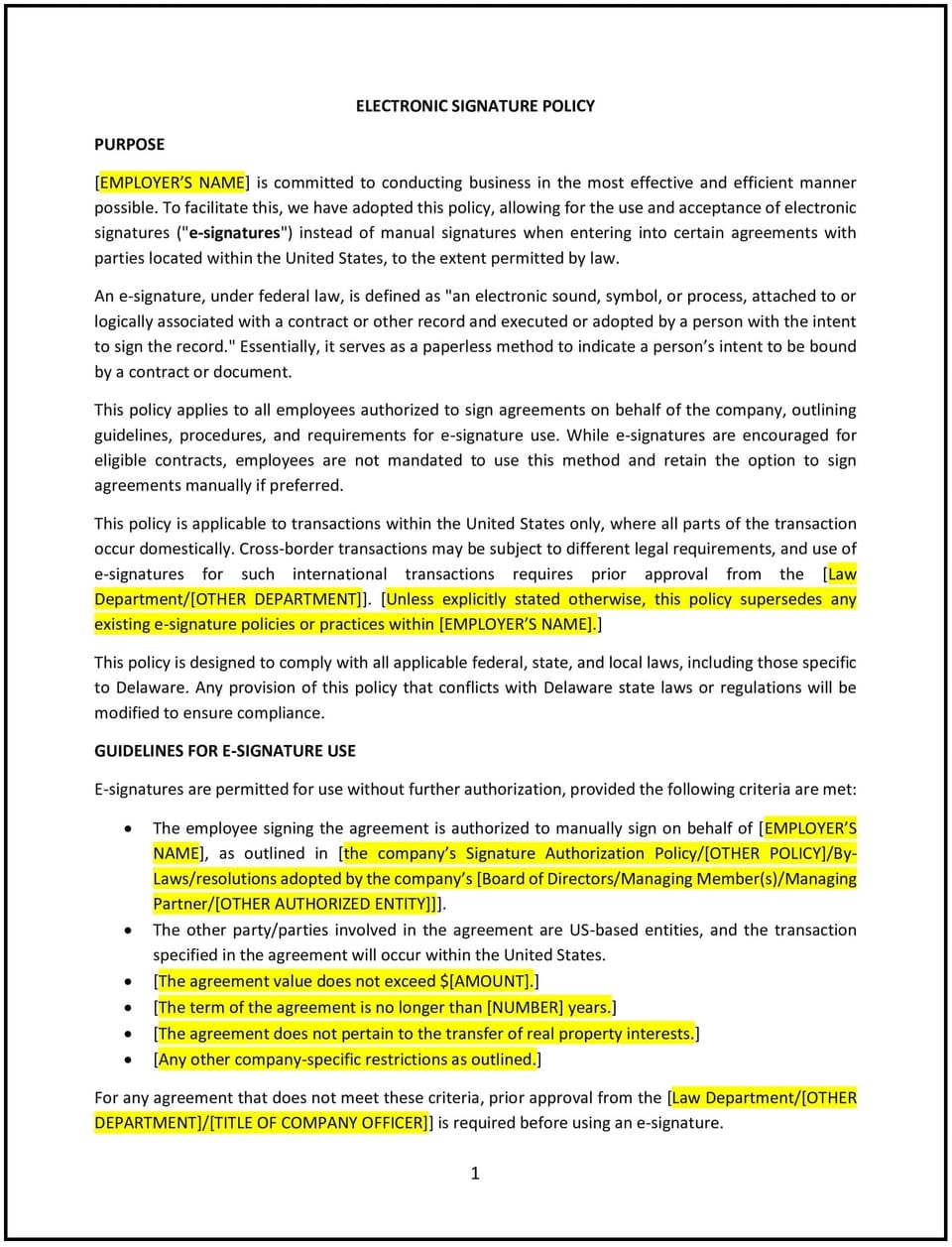Electronic signature policy (Delaware): Free template

Electronic signature policy (Delaware)
An electronic signature policy helps Delaware businesses establish guidelines for using electronic signatures in transactions and document approvals. This policy outlines the legal framework, acceptable use cases, and procedures to ensure compliance with Delaware’s Uniform Electronic Transactions Act (UETA) and other relevant regulations.
By implementing this policy, businesses can streamline processes, enhance efficiency, and ensure the security and validity of electronic signatures.
How to use this electronic signature policy (Delaware)
- Define acceptable use cases: Specify which documents and transactions are eligible for electronic signatures, such as contracts, approvals, or internal forms.
- Ensure legal compliance: Align the policy with Delaware’s UETA and federal laws like the ESIGN Act to validate electronic signatures.
- Specify technology requirements: Outline the approved platforms or software for creating, sending, and storing electronically signed documents.
- Address authentication methods: Require secure processes for verifying the identity of signatories, such as email verification, multi-factor authentication, or audit trails.
- Maintain record-keeping: Provide guidelines for storing electronically signed documents securely and ensuring they remain accessible for audits or legal purposes.
- Communicate limitations: Clarify situations where electronic signatures may not be acceptable, such as documents requiring notarization under Delaware law.
Benefits of using this electronic signature policy (Delaware)
This policy offers several benefits for Delaware businesses:
- Streamlines processes: Reduces the time and cost associated with obtaining handwritten signatures and managing physical documents.
- Enhances compliance: Ensures electronic signatures meet Delaware and federal legal requirements, reducing the risk of disputes.
- Improves security: Provides clear guidelines for secure authentication and storage of signed documents.
- Increases accessibility: Allows for faster and more convenient transactions, especially for remote or hybrid teams.
- Promotes environmental sustainability: Reduces reliance on paper, aligning with eco-friendly business practices.
Tips for using this electronic signature policy (Delaware)
- Communicate the policy clearly: Ensure all employees and stakeholders understand the acceptable use of electronic signatures and the approved platforms.
- Provide training: Offer guidance on using electronic signature tools and understanding legal compliance requirements.
- Use secure platforms: Choose software with robust security features, such as encryption and audit trails, to protect signed documents.
- Monitor compliance: Regularly review electronically signed documents to ensure they adhere to the policy and legal standards.
- Review and update: Periodically revise the policy to reflect changes in Delaware laws, technology, or business needs.
Q: Why is an electronic signature policy important for my business?
A: This policy ensures the legal validity of electronic signatures, enhances operational efficiency, and promotes secure and compliant document management.
Q: What types of transactions can be conducted using electronic signatures?
A: Electronic signatures can be used for a variety of transactions, such as contract approvals, purchase agreements, internal approvals, and other legally binding documents, as specified in the policy.
Q: How does the policy ensure the security of electronic signatures?
A: The policy requires the use of approved platforms with robust security measures, such as encryption, audit trails, and identity verification, to protect the integrity of signed documents.
Q: Are there any documents that cannot be signed electronically?
A: Certain documents, such as those requiring notarization or specific formalities under Delaware law, may not be eligible for electronic signatures. These exceptions should be outlined in the policy.
Q: How often should this policy be reviewed?
A: This policy should be reviewed annually or whenever Delaware laws, technology, or business practices change to ensure continued compliance and effectiveness.
This article contains general legal information and does not contain legal advice. Cobrief is not a law firm or a substitute for an attorney or law firm. The law is complex and changes often. For legal advice, please ask a lawyer.


